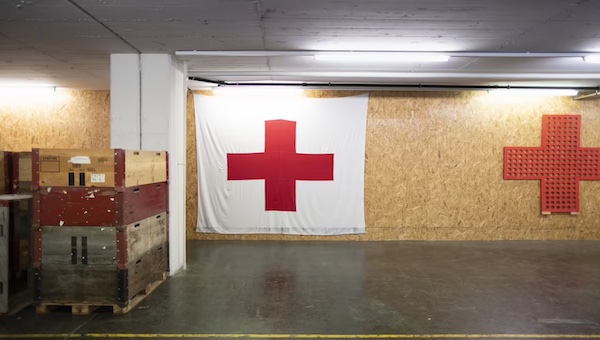
A FLAG OF THE SWISS RED CROSS HANGS ON A WALL IN THE SRC LOGISTICS CENTRE IN WABERN, SWITZERLAND. (KEYSTONE/GAETAN BALLY)
SWISS RED CROSS CLEANING HOUSE AMID LEADERSHIP CRISIS
BY: PAULA DUPRAZ-DOBIASORIGINAL SITE: GENEVA SOLUTIONS
TOPICS
Activism
AI
Belief
Big Pharma
Conspiracy
Cult
Culture
Economy
Education
Entertainment
Environment
Faith
Global
Government
Health
Hi Tech
Leadership
Politics
Prophecy
Science
Security
Social Climate
Universe
War
Since the end of 2022, Switzerland’s biggest aid organisation at the heart of an emblematic global movement has been making the headlines for the wrong reasons. National stakeholders are hoping that an internal crisis at the Swiss Red Cross will soon be overcome.
Nearly six months after Markus Mader, the Swiss Red Cross’s director, was forced to step down and four of its ten board members left in protest, the organisation’s president, Barbara Schmid-Federer, announced Friday she was resigning with immediate effect.
Her departure, which she attributed to “health reasons”, came just days after the publication of a damning independent report detailing mismanagement issues within the humanitarian group.
On Sunday, the weekly NZZ am Sonntag wrote that “influential circles in the field of politics and humanitarian aid” have been courting the former Swiss government minister, Simonetta Sommaruga – who resigned from that role at the end of 2022 for family reasons – to take over.
Raymond Ruch, communications chief at the Swiss Red Cross, told Geneva Solutions on Monday that the next steps have not yet been decided yet on the leadership replacement. Schmid-Federer, a former politician with the Swiss Christian Democratic People’s Party, had assumed the SRC’s presidency last June.
Pulling the curtain back
In late December, the SRC’s audit commission contracted an independent firm, Res Publica Auditing, to investigate the circumstances that had led to the departure of Mader amid allegations of “verbal assaults” on him by the president, as reported in the Neue Zürcher Zeitung (NZZ) and rejected by Schmid-Federer.
Read more: Swiss Red Cross shakeup sparks ramification fears
The 41-page report offered a chronology of events dating back to 2017, citing divergent viewpoints in the group’s upper management between “centralists” and those favouring greater sway within the organisation of cantonal societies. The Swiss Red Cross is made up of 24 local associations representing all but two of Switzerland’s cantons and half-cantons.
The enquiry reported that even among cantonal associations, an earlier poll showed that members recognised an organisational “culture incapable of resolving conflicts”.
Most damaging, however, was the assessment of the president, which the report said “demonstrated little ability and willingness to lead, both with regard to the management Red Cross Council (RCC) and towards the director, as well as a lack of courage to manage difficult or awkward situations”.
On Friday, Schmid-Federer issued a statement saying: “The past few months have been intense and stressful for me. The attacks on the reputation of the SRC and on myself have pushed me to the limit of my resilience.”
Geneva Solutions tried to contact the former president through various channels but didn't receive a response by the time this article was published.
The report also charged that the remaining board members showed “little benevolence toward their other RCC colleagues”, including in rejecting a mediation proposal that had been made by the audit commission. “A majority of RCC members did not demonstrate any empathy toward the director’s situation,” it added.
Mader had repeatedly complained in his final months before leaving the SRC about his deteriorating health amid increasing work-related stress.
The independent report wrote that the director had been well-liked at Red Cross headquarters, benefitting from a wide network that contributed to the organisation’s global image. It noted that his management had been recognised in the Handelszeitung ranking of healthcare and social assistance institutions. Nonetheless, it said that in early December 2022, when tensions with the president were in peak mode, Mader failed to exhibit self-criticism on one instance regarding a proposal made in early December as the aid group sought to consolidate wider organisational differences.
In a short phone interview, Mader told Geneva Solutions that he had tried to find solutions many times, but on this particular occasion, “in a cry for help, when you are trying to find a solution, you may not be necessarily self-critical,” he said. He stressed that in his email to the president and the council, he wrote: “I certainly also made mistakes.”
He said he felt sad on reading the report, in spite of it representing a “complete rehabilitation” of himself.
The Council rejected many of the conclusions made in the report, saying that it contained factual errors and inconsistencies in its appreciation of the situation.
Res Publica Auditing meanwhile said remaining board members were interviewed together at their request to express themselves as a single voice, while an initial plan to conduct an anonymous staff survey at the headquarters was dropped due to disagreements between the Council and the audit commission.
RTS reported that SRC operations, including the delivery of medical assistants’ certificates and transportation of elderly residents to health appointments, have not been affected by the crisis.
The International Federation of the Red Cross and Red Crescent Societies (IFRC), where the Swiss Red Cross holds a permanent seat within its governing board, said in a statement following Schmid-Federer’s resignation that it “trusts the Swiss Red Cross and its mechanisms to detect and respond effectively to any issue.”
Elections for open positions on the organisation's board are expected to take place during its annual general meeting, planned for 24 June.
